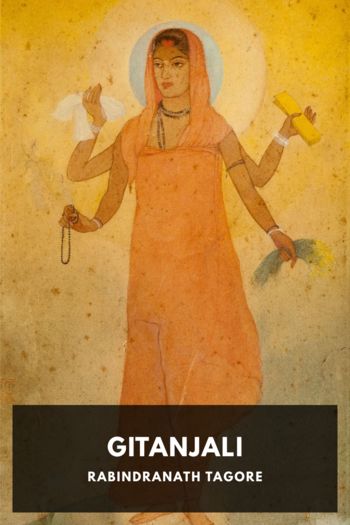My Reminiscences - Rabindranath Tagore (best ereader for pc txt) 📗

- Author: Rabindranath Tagore
Book online «My Reminiscences - Rabindranath Tagore (best ereader for pc txt) 📗». Author Rabindranath Tagore
In the first flood-tide of that joy I paid no heed to the bounds of metrical form, and as the stream does not flow straight on but winds about as it lists, so did my verse. Before, I would have held this to be a crime, but now I felt no compunction. Freedom first breaks the law and then makes laws which brings it under true Self-rule.
The only listener I had for these erratic poems of mine was Akshay Babu. When he heard them for the first time he was as surprised as he was pleased, and with his approbation my road to freedom was widened.
The poems of Vihari Chakravarti were in a three-beat metre. This triple time produces a rounded-off globular effect, unlike the square-cut multiple of two. It rolls on with ease, it glides as it dances to the tinkling of its anklets. I was once very fond of this metre. It felt more like riding a bicycle than walking. And to this stride I had got accustomed. In the Evening Songs, without thinking of it, I somehow broke off this habit. Nor did I come under any other particular bondage. I felt entirely free and unconcerned. I had no thought or fear of being taken to task.
The strength I gained by working, freed from the trammels of tradition, led me to discover that I had been searching in impossible places for that which I had within myself. Nothing but want of self-confidence had stood in the way of my coming into my own. I felt like rising from a dream of bondage to find myself unshackled. I cut extraordinary capers just to make sure I was free to move.
To me this is the most memorable period of my poetic career. As poems my Evening Songs may not have been worth much, in fact as such they are crude enough. Neither their metre, nor language, nor thought had taken definite shape. Their only merit is that for the first time I had come to write what I really meant, just according to my pleasure. What if those compositions have no value, that pleasure certainly had.
XXXI An Essay on MusicI had been proposing to study for the Bar when my father had recalled me home from England. Some friends concerned at this cutting short of my career pressed him to send me off once again. This led to my starting on a second voyage towards England, this time with a relative as my companion. My fate, however, had so strongly vetoed my being called to the Bar that I was not even to reach England this time. For a certain reason we had to disembark at Madras and return home to Calcutta. The reason was by no means as grave as its outcome, but as the laugh was not against me, I refrain from setting it down here. From both my attempted pilgrimages to Lakshmi’s48 shrine I had thus to come back repulsed. I hope, however, that the Law-God, at least, will look on me with a favourable eye for that I have not added to the encumbrances on the Bar-library premises.
My father was then in the Mussoorie hills. I went to him in fear and trembling. But he showed no sign of irritation, he rather seemed pleased. He must have seen in this return of mine the blessing of Divine Providence.
The evening before I started on this voyage I read a paper at the Medical College Hall on the invitation of the Bethune Society. This was my first public reading. The Reverend K. M. Banerji was the president. The subject was Music. Leaving aside instrumental music, I tried to make out that to bring out better what the words sought to express was the chief end and aim of vocal music. The text of my paper was but meagre. I sang and acted songs throughout illustrating my theme. The only reason for the flattering eulogy which the President bestowed on me at the end must have been the moving effect of my young voice together with the earnestness and variety of its efforts. But I must make the confession today that the opinion I voiced with such enthusiasm that evening was wrong.
The art of vocal music has its own special functions and features. And when it happens to be set to words the latter must not presume too much on their opportunity and seek to supersede the melody of which they are but the vehicle. The song being great in its own wealth, why should it wait upon the words? Rather does it begin where mere words fail. Its power lies in the region of the inexpressible; it tells us what the words cannot.
So the less a song is burdened with words the better. In the classic style of Hindustan49 the words are of no account and leave the melody to make its appeal in its own way. Vocal music reaches its perfection when the melodic form is allowed to develop freely, and carry our consciousness with it to its own wonderful plane. In Bengal, however, the words have always asserted themselves so, that our provincial song has failed to develop her full musical capabilities, and has remained content as the handmaiden of her sister art of poetry. From the old Vaishnava songs down to those of Nidhu Babu she has displayed her charms from the background. But as in our country the wife rules her husband through acknowledging her dependence, so our music, though professedly in attendance only, ends by dominating the song.
I have often felt this while composing my songs. As I hummed to myself and wrote





Comments (0)